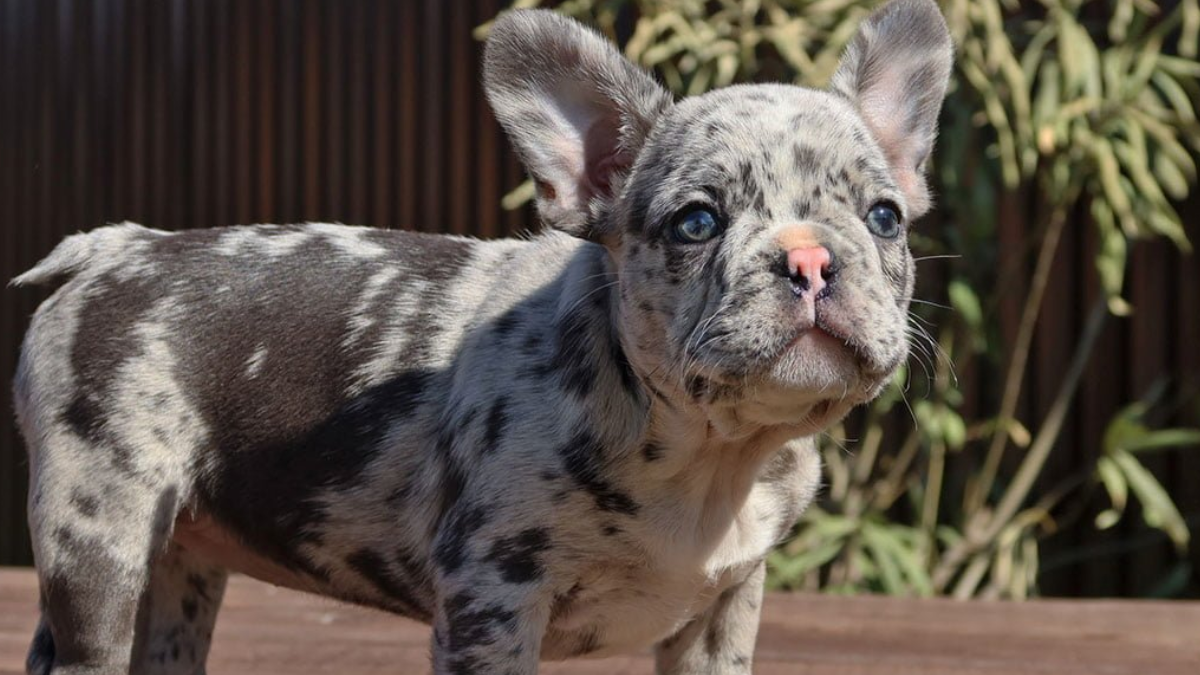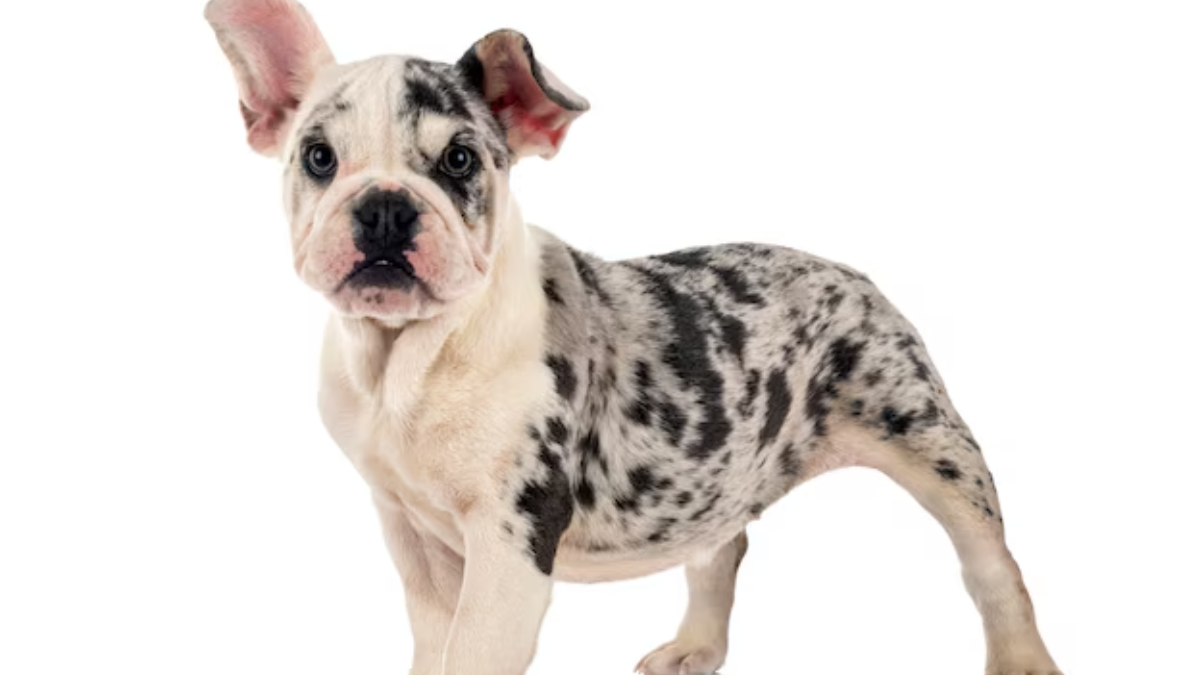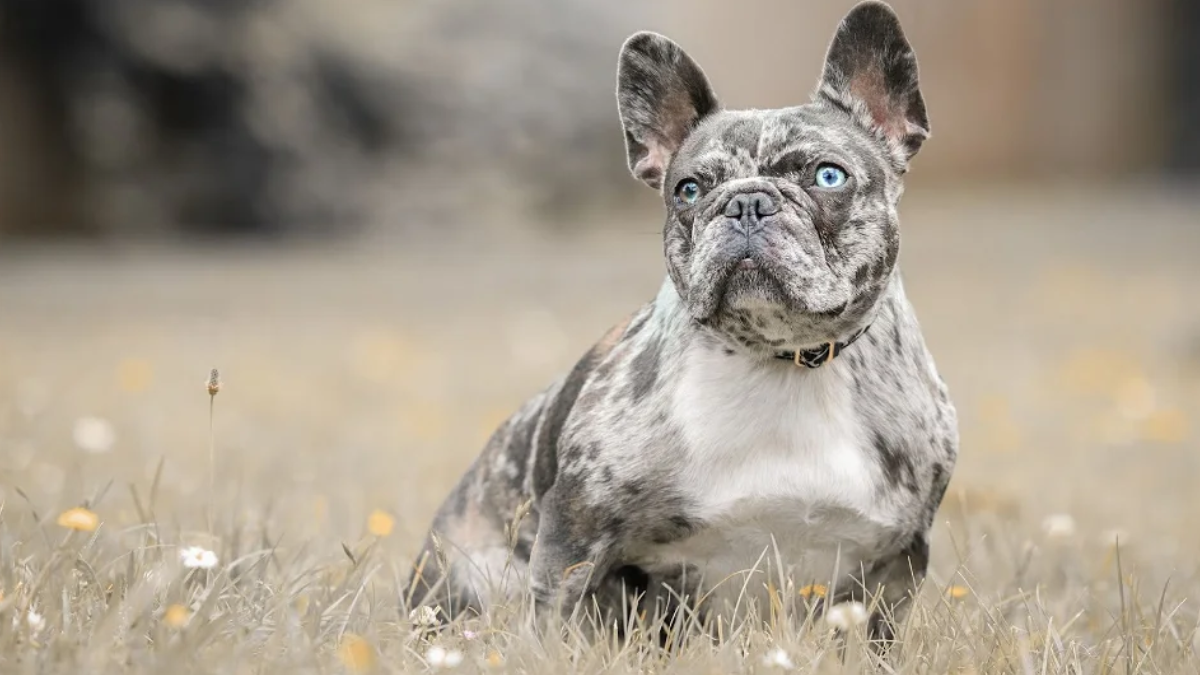The Merle French Bulldog exhibits a unique pattern of mottled patches of color, making it a standout variety within the French Bulldog breed. This distinct coloring comes from a specific genetic trait that causes random dilutions in the coat, creating a beautiful, marbled effect. Due to the complexity of this genetic trait, breeding Merle French Bulldogs requires careful and responsible practices to ensure the health and well-being of the dogs.

While Merle French Bulldogs are sought after by enthusiasts, their rarity contributes to a higher cost compared to other French Bulldog color patterns. The Merle gene itself does not occur naturally in French Bulldogs, which has led to controversy among breeders and enthusiasts regarding the ethics and health issues associated with breeding for this particular coloration. Despite this, the Merle French Bulldog continues to gain popularity, captivating the hearts of potential owners worldwide.
Interested buyers should note that the Merle French Bulldog's popularity does not negate the importance of finding a reputable breeder. Due to the specific health considerations connected with the Merle gene, such as potential hearing and vision problems, it's crucial for prospective owners to understand the care requirements and be prepared for the financial commitment involved in owning one of these rare and visually striking dogs.
Breed Overview
The Merle French Bulldog is a distinctive variant of the French Bulldog, a breed well known for its bat-like ears, compact build, and affectionate nature. This particular type features a unique merle coat pattern characterized by mottled patches of color, which is unlike the solid coat colors traditionally associated with the breed.
Genetics: The merle pattern is the result of a specific gene that alters the coat color. Breeders should exercise caution, as breeding two-merle French Bulldogs can lead to health issues associated with the double-merle gene.

Kennel Club Recognition: The American Kennel Club (AKC) does not recognize the merle color pattern in its breed standard for French Bulldogs, which may impact registration eligibility for show and breeding purposes. Despite this, the Merle French Bulldog is popular among some breed enthusiasts.
- Health Considerations: Breeding French Bulldogs, including merle variants, often involves health considerations due to their brachycephalic nature. It is important for breeders to follow responsible practices to avoid exacerbating breathing issues or other genetic health problems.
- Breeder Selection: Prospective owners should seek reputable breeders who can provide health clearances and assure that their breeding practices align with the well-being of the dogs. This helps maintain the integrity of the breed and the health of individual animals.
Isabella French Bulldogs: A related note is the Isabella French Bulldog, another rare type, distinguished by its light coat color. Like the Merle, this coloration does not align with traditional breed standards, but it has gained attention among French Bulldog aficionados.
The Merle French Bulldog stands out as an example of how selective breeding can influence the appearance of a breed, underscoring the importance of a knowledgeable approach to breeding practices and breed standards.
Merle French Bulldog Characteristics
The Merle French Bulldog is a distinct and sought-after breed that captivates enthusiasts with its unique coat pattern and endearing qualities. These dogs not only showcase an array of appealing physical attributes but also possess spirited temperaments, with diverse colors and patterns stemming from complex genetics.

Appearance
The merle French Bulldog has a unique coat color pattern characterized by patches of darker hair over a lighter base color, creating a marbled effect. Physical features include a compact, muscular build, a short face, and the breed's trademark bat ears.
- Variations of Merle Pattern:
- Blue Merle: A mix of blue and gray shades.
- Lilac Merle: A blend of lavender and light gray colors.
Temperament
Merle Frenchies are known for their playful and affectionate personality. These dogs are social creatures enjoying the company of their owners and other dogs. Consistent training is crucial to harness their intelligence and vivacity.
Genetics and Breeding
Breeding merle French Bulldogs involves a dominant merle gene. Careful genetic testing is imperative for breeders to prevent health issues associated with the double-merle — offspring of two merle-patterned parents.
- Breeding Considerations:
- Avoid breeding of double merles due to health risks.
- Employ genetic testing to ensure responsible breeding practices.
Color Variations
Merle Frenchies present a range of color variations while maintaining the merle pattern. Colors include blue, red, black, chocolate, and fawn. Non-merle and cryptic merle, a subtle variation, also exist within the breed.

- Common Merle Color Variations:
- Chocolate Merle
- Fawn Merle
- Black Merle
Health Concerns
Health complications in Merle French Bulldogs can include deafness, blindness, and skin issues. Reputable breeders screen for these conditions and prioritize the health of the breed over appearance.
- Eye and Ear Health: Increased vulnerability to blindness and deafness.
- Skin and Coat: Potential for allergies and skin pigment issues.
Exercise and Grooming
They require moderate exercise and a consistent grooming routine. Daily play and a balanced diet contribute to their well-being, while regular cleaning can prevent skin infections and manage shedding.
- Exercise Needs: Daily walks and regular play sessions.
- Grooming Routine: Frequent brushing to minimize shedding and skin issues.

Pricing and Availability
The Merle French Bulldog's rarity can manifest in a heftier price tag in comparison to standard colors. The cost varies according to the rarity of the coat color, lineage, and breeder reputation.
- Cost Influences:
- Coat color complexity
- Breeder reputation
History and Popularity
The breed has gained popularity for its endearing looks and temperament. Recognition of merle French Bulldogs by kennel clubs depends on the organizations' standards, and the American Kennel Club (AKC) does not currently recognize merle as a standard color.
Owner Responsibilities
Prospective owners should prioritize researching proper care and dedicating time to training and socialization. They should also find a reputable breeder who conducts comprehensive health screenings.
- Key Responsibilities:
- Adequate training and socialization
- Commitment to health care and regular vet check-ups Merle
Merle Gene Science
The science behind the Merle gene is extensive, with the Merle pattern being a result of a dominant gene that affects coat color and can influence eye color. Breeding demands understanding these genetics to avoid health complications associated with the gene.

- Dominant Gene Implications:
- Can cause a variety of eye colors, including bright blue or heterochromia.
- Requires careful breeding to circumvent potential negative effects.
Conclusion:
In conclusion, the Merle French Bulldog epitomizes a perfect blend of charm and uniqueness with its captivating coat patterns. Beyond their stunning appearance, these dogs bring boundless joy and affection to any household. By understanding their specific care needs and offering love and attention, you can cultivate a deep and fulfilling bond with your Merle French Bulldog. Embrace the special qualities of this beloved breed, and cherish the companionship and happiness they bring into your life every day.






